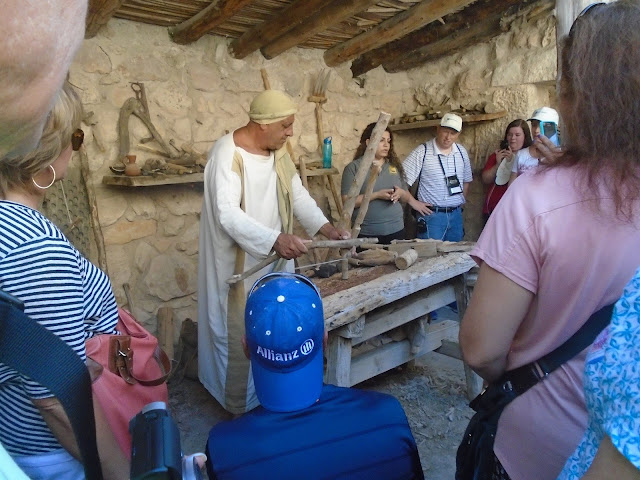Jesus grew up in Nazareth. He probably learned to be a carpenter from Joseph. He knew the village and surrounding hillside. He played with other children and learned the culture of the Jews.
He also learned about His mission and destiny. Who were His teachers?
Eventually He preached here and announced in the synagogue that He was the Messiah, but the people of Nazareth rejected Him. A prophet is not without honor except in his own country.
This is also the place that Nephi saw in vision when the angel revealed Mary the mother of Jesus to him. This is the place where Gabriel told Mary she would be the mother of the Son of God. This is the place where Gabriel visited Joseph and told him to take Mary to be his wife and the name her son Jesus.

We visited a reconstructed village in Nazareth which depicted Jesus's childhood home.
.


We saw our first olive press here. The olives are hung in bags and weighted to extract the first oil. This is the prized virgin olive oil
In this type of press the olives are pitted and then crushed. This releases more oil. Oil is 50 % or more of the weight of the olives.

An olive garden, early tools from the period, traditional weaving and a shepherd, are some of the things we saw here. Local Christians volunteer to be actors at this sight to make the experience more real.
This is how the olives look on the tree.

The woman who was weaving was animated and joyful. Someone mentioned to her that she could get rich selling her rugs and mats. She did a little dance and said, "I am already rich, because I am the daughter of the King of Kings."
For some reason I was a little surprised to find Christians in Israel who openly displayed their love for Jesus Christ. I asked how many Christians live in Israel. Our guide estimated that there are around 160,000 or less than 5% of the population.
 |
| A noisy donkey. Donkeys were a common way of transporting people and goods in Nazareth. Especially for the poor. |
 |
A wine press. Many families made their own olive oil and their own wine.. They used their feet to mash the grapes so that they would not crush the seeds which would make the wine bitter. There was a channel cut in the ground to carry the wine to a vat where it could be put into bottles.
|




















